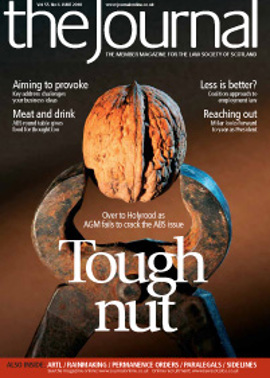Get it right first time

When RoS receives a registration application that has an omission or defect, rather than rejecting or cancelling it, RoS generally operates a requisition process, putting the application into “standover” and addressing the issue with the submitting party. This often involves returning a document for amendment or requesting supplementary evidence. Taking this approach is not without cost to applicants, conveyancing practitioners and RoS itself.
In 2009, 36% of first registration applications went into standover. The corresponding figures for transfers of part of a registered title and dealings with whole were 29% and 16%. Individual requisition rates vary between firms, but on average 12% of applications received go into standover. The costs of administering such numbers are significant.
The standover facility can serve a useful purpose, for example with complex applications for first registration or company standard securities where the applicant cannot provide all the necessary registration evidence at the point of application. However, the majority of applications in standover are entirely avoidable and are there because of straightforward errors or the omission of key supporting evidence. In most cases, a requisition could be avoided with simple checking of the application before it is sent to RoS.
To reduce the incidence and costs of requisitions for transactions received on or after 1 September 2010:
- We will no longer delay registration pending receipt of a discharge that has been marked “to follow”. This may result in a land certificate being issued showing an outstanding standard security by the previous owner. However, it is possible to demonstrate that the prior standard security has been removed from the title sheet by obtaining a Form 12 report or a copy of the title sheet from Registers Direct (the current fee for the latter is £1.80). If an application to register the discharge is submitted before the related application is completed we will process them together.
- We will no longer issue a reminder once the 60-day standover period has elapsed. Failure to respond to a request within this period will result in the application being cancelled or progressed with an exclusion of indemnity. However, if a solicitor is experiencing particular difficulty in meeting a requisition, we will consider extending the compliance period if, during that period, we are asked to do so in writing with a full explanation of the reasons for the delay.
Full details of the changes will be provided in a future Registers Update.
In the meantime, we intend to contact those firms who have the highest percentage of applications placed into standover. If you would like to obtain the figure for your firm please contact Lyn Drysdale (lyn.drysdale@ros.gov.uk).
We hope that by working with the legal profession we can reduce the incidence of standover and the Law Society supports our efforts. John Scott, solicitor in the Professional Practice Department and secretary to the Conveyancing Committee comments:
“The Society welcomes any measures that speed up the issue of land and charge certificates to confirm that purchasers have a good title and lenders a valid security. We would encourage our members to co-operate fully with RoS in this initiative. Firms should ensure they have systems in place to double-check the accuracy and completeness of applications prior to despatch.
“Any requisitions received should be replied to as soon as possible, particularly if they can be dealt with without reference to the clients or the sellers’ agents. If it becomes apparent that the matter may not be resolved within the 60-day period, RoS should be informed immediately so they can give due consideration to an extension.”
If standover rates remain high, we may have to consider introducing further measures to lessen the impact. These range from seeking legislative change to reduce the standover period from the current 60 days, through to withdrawal of the facility for certain transaction types and/or certain errors and omissions.
Practical guidance
To assist conveyancers, RoS provides a range of practical guidance on their website, a Pre-registration Enquiries Service and, for complex title matters, a fee-based Title Investigation Service.
Contact details
- Stuart Payne, Title Investigation Service, Registers of Scotland, Meadowbank House, 153 London Road, Edinburgh EH15 7AU (DX555327, Edinburgh 15) t: 0131 659 6111, ext 3718
- Pre-Registration Enquiries, Legal Services Directorate, Registers of Scotland, Meadowbank House, 153 London Road, Edinburgh EH8 7AU (DX: 550907, Edinburgh 9; LP: 55, Edinburgh 5). t: 0845 607 0163. f: 0131 479 3675. e: pre-reg@ros.gov.uk
Information on preparing an application for registration in the Land Register can be found in the following guidance leaflets, which are available on our website www.ros.gov.uk
- A Well Planned Registration
- A Guide to Good Deeds
- A Guide to the registration of deeds containing new real burdens
ARTL UPDATE – as at 21 May 2010
- 25,720 ARTL transactions have taken place.
Live on ARTL
- 333 solicitors’ firms are currently on the ARTL system
- 22 lenders are currently on the ARTL system
- 12 local authorities are using the system.
For up-to-date information and a full list of participating practices and companies, go to: ros.gov.uk/artl
In this issue
- Embrace "the new lawyer", mediation expert will tell conference
- Best practice governance for family businesses: a new dawn
- Spanning the divide
- Action on Gill review
- A House divided?
- Get it right first time
- Views from the front line
- Push for change
- "If ABSs are the answer, what's the question?"
- Common cause
- Shaping a new life
- Essential artl
- Smart bows out at AGM
- It's the final countdown
- Law reform update
- Ask Ash
- Here comes the rain again...
- True or false?
- Journey's end
- Win some, lose some
- Forget getting paid!
- Thumbs up for Google?
- A sporting result?
- Buying into good causes
- Scottish Solicitors' Discipline Tribunal
- Website review
- Book reviews






